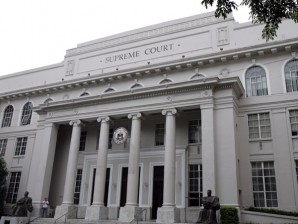Supreme Court unseats Lucena mayor
LUCENA CITY—Incumbent Lucena Mayor Barbara Ruby Talaga (Lakas-Kampi) was unseated by the Supreme Court and replaced by her vice mayor, Roderick Alcala (Liberal Party).
In an SC decision dated Oct. 9, 2012 but was only released Thursday, a copy of which was posted on its website, the court affirmed the decision of the Commission on Election en banc on May 20, 2011 that annulled the election and proclamation of Talaga as mayor of Lucena and cancelled the certificate of canvass that declared her as the winner in May 10, 2010 election.
The said Comelec resolution also granted the petition for intervention of Alcala and ordered him to succeed Barbara as provided under Section 44 or the “succession rule” for elected local officials under Republic Act 7160 or the Local Government Code of 1991.
The poll body had reversed and set aside the resolution by the Comelec 2nd Division in January 2011 that ruled Talaga’s election as valid and legal.
Lucena Councilor Rey Olivier Alejandrino, Alcala’s political ally, said the vice mayor received the copy of the SC decision Thursday afternoon.
The vice mayor is a nephew of Agriculture Secretary Proceso Alcala, a close ally of President Benigno Aquino III.
Talaga’s youngest son, number one Lucena Councilor Ramil Talaga, will replace Alcala as vice mayor.
Questions on the legitimacy of Talaga’s assumption to office arose when she substituted for her husband Ramon Talaga Jr. then the incumbent city mayor.
In 2010 election, Ramon, while then serving his last term, filed his CoC with the belief that he was still qualified to run for a fresh term because he was suspended for three months and thus failed to serve three consecutive terms in office.
But the Comelec later ruled he was no longer qualified to run for another term. Under existing elections law, a local elected official (councilors to congressmen) can only serve for three consecutive three-year terms.
Ramon had himself substituted by his wife just six days before the elections, a fact that was hidden from their political foes and the city electorate.
In the final tally, Ramon received 44,099 votes while his opponent Philip Castillo, a former vice mayor, earned 39,615.
Based on existing election laws on substitution, the votes garnered by Ramon were automatically considered votes for his substitute, his wife Barbara.
Castillo consequently asked the Comelec to declare him as the winner as he argued that since Ramon’s candidacy was found by the poll body to be defective and null and void from the start, it meant that he ran unopposed and thus should be declared as the victor in the last election.
In the 26-page SC decision penned by Associate Justice Lucas Bersamin, the high tribunal ruled that Ramon’s disqualification rendered his CoC invalid and thus, could not be validly substituted.
“Considering that a cancelled CoC does not give rise to a valid candidacy, there can be no valid substitution of the candidate…that a candidate who does not file a valid CoC may not be validly substituted because a person without a valid CoC is not considered a candidate in much the same way as any person who has not filed a CoC is not at all a candidate,” the SC said.
However, the SC dismissed Castillo’s assertion that he was entitled to assume the city mayoralty post for having obtained the highest number of votes among the remaining qualified candidates.
The high tribunal reiterated its earlier ruling that “a candidate obtaining the second highest number of votes for the contested office could not assume the office despite the disqualification of the first placer because the second placer was ‘not the choice of the sovereign will'”.
The SC added: “There was to be no question that the second placer lost in the election, was repudiated by the electorate, and could not assume the vacated position. No law imposed upon and compelled the people of Lucena City to accept a loser to be their political leader or their representative”.
Although not an original party to the poll protest between Castillo and Talaga, Alcala filed a petition for intervention with the Comelec last July 22, 2010 to implement Section 44 or the “succession rule” for elected local officials under RA 7160 or the Local Government Code of 1991.
The SC said Talaga’s dismissal has resulted to a permanent vacancy in the office of Lucena mayor and such vacancy should be filled pursuant to the law of succession as defined under the Local Government Code.
Ramon, who is the current city administrator, will clash with Alcala for the mayoralty post in next year election.
Ramil, youngest son of the Talagas, will be the running mate of his father. The young Talaga will face opposition from Castillo (LP).















